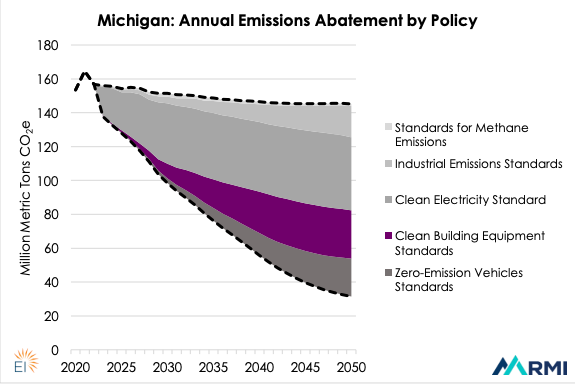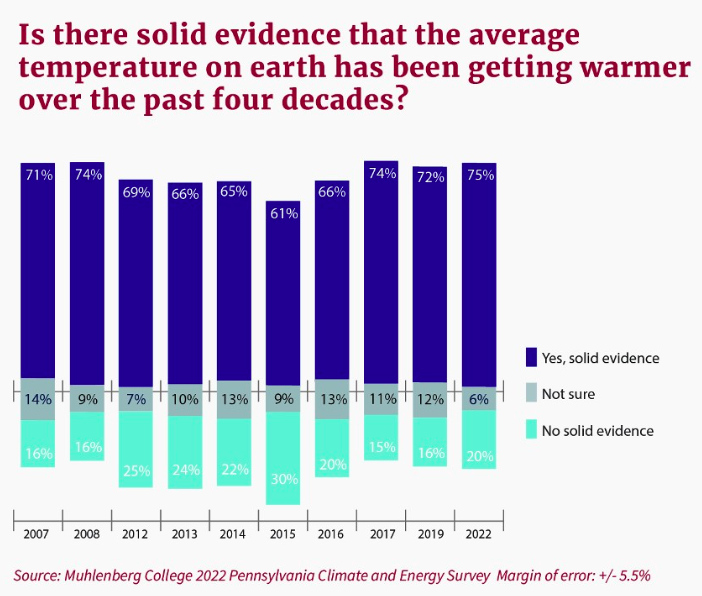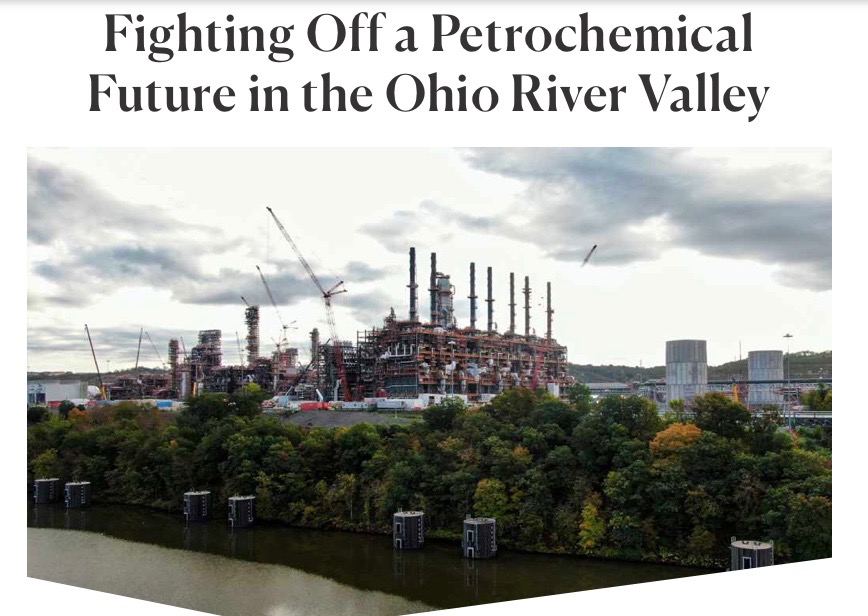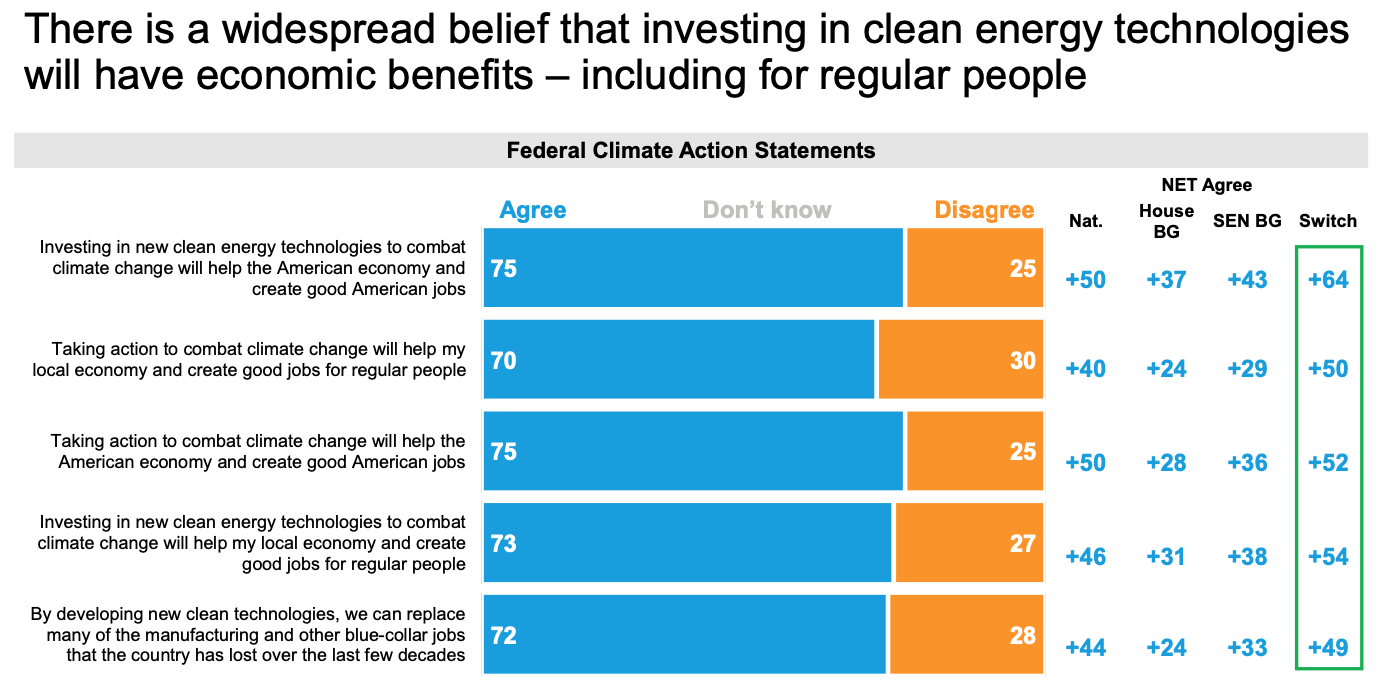Resources
Search below for resources covering the intersection of climate engagement, social science and data analytics.
RESULTS
Voters in key states want stronger limits on methane emissions, and believe that implementing technology to limit methane pollution is more likely to create jobs than reduce them. By a 68%-26% margin, battleground state voters support stronger EPA limits on methane emissions from the oil and gas industry. By a 69%-27% margin, Pennsylvania voters support stronger EPA limits on methane emissions from the oil and gas industry. By a 66%-28% margin, Texas voters support stronger EPA limits on methane emissions from the oil and gas industry. By a 55%-41% margin, battleground state voters are more likely to agree that stronger methane pollution limits will create jobs than reduce jobs. By a 56%-42% margin, Pennsylvania voters are more likely to agree that stronger methane pollution limits will create jobs than reduce jobs. By a 58%-42% margin, Texas voters are more likely to agree that stronger methane pollution limits will create jobs than reduce jobs.
Poll: Voters in Key Farm Bill States Support New Approaches to the Food and Farm Bill
Amid Farm Bill negotiations, voters in key states are more likely to support political candidates who want to help farmers to adapt to extreme weather and to be part of the solution to climate change. Voters in the four states are highly motivated in their support for programs that would help farmers adapt to extreme weather and mitigate climate change. Majorities in Colorado (69%), Georgia (66%), Michigan (65%) and Pennsylvania (70%) said they would be more likely to support a candidate for office who offered ideas along those lines. Large majorities in each of the four states, upwards of 76% of voters, identified corporate consolidation that squeezes small and midsize farmers and food businesses as a threat in their state. Notably, that jumped to 89% of households with a farmer. Majorities in every state, with a high of 89% in Pennsylvania, supported increasing investments that help small and midsize farmers compete with large corporate agribusiness. Very large majorities of voters supported programs that help farmers protect water quality and keep more carbon and nutrients in their soil, from 86% in Georgia to a high of 88% in Michigan and Pennsylvania. Majorities of voters in each state – as many as 68% in Michigan – and 66% of voters with a farmer in the house said water pollution caused by agricultural runoff is a threat to their state.
Poll: Rural voters may be swingable
While partisanship remains strong among the rural electorate, more than one-third (37%) of rural voters appear "swingable" in future elections, depending on resonant policy proposals and messaging. Three messaging points — lowering prices; bringing good-paying jobs to local communities; and a populist message focused on corporate greed — received such broad support that they rivaled voters’ agreement on core values like family and freedom. Read additional analysis in the Daily Yonder's coverage.
Top State Energy Policies To Cut Carbon Emissions
Just five policies across the economy can dramatically cut state greenhouse gas emissions. These include clean electricity standards; zero-emission vehicle standards; clean building equipment standards; industrial efficiency and emissions standards; and standards for methane detection, capture, and destruction. This report evaluates emissions trajectories and policy impacts for six states: Louisiana, Michigan, Minnesota, New Mexico, Pennsylvania, and Wisconsin. These states have widely varying emissions profiles. For example, Louisiana’s emissions are dominated by the industrial sector, while in Michigan, the building sector is a significant contributor. In New Mexico, home to significant oil and gas extraction, methane is a major source of GHG emissions.
Environmental Polling Roundup - July 29th, 2022
This post includes climate and environment headlines, data points, and key takeaways from recent public polls - including new polling on voters’ reactions to arguments from the two parties on climate change; the impact of climate change and the environment on battleground voters’ decisions in the upcoming midterms; an experiment in communicating about human-caused climate change using a “heat-trapping blanket” metaphor; Americans’ personal experiences with climate change; and the widening generational gap in Republicans’ environmental attitudes.
Environmental Polling Roundup - July 1st, 2022
This post includes climate and environment headlines, data points, and key takeaways from recent public polls - including new polling about West Virginia vs. EPA and the EPA’s authority, a survey of climate attitudes among Facebook users across 192 countries and territories, and new state-level polling in Pennsylvania about climate change and the state’s fracking industry.
Poll: Spring 2022 Pennsylvania Climate and Energy Survey
A record-high percentage of Pennsylvanians (75%) say there is “solid evidence” of global warming; Pennsylvanians are divided on fracking and the long-term impacts of gas drilling in the state. 77% of Pennsylvanians view global warming as a “serious problem” (including 53% who rate it as “very serious”) further demonstrates a clear statewide consensus around the reality and risks of climate change. The poll also finds that Pennsylvanians are feeling cross-pressured on the issue of fracked gas, as large majorities believe both that gas drilling is important to the state’s economy (86%) and that it poses a major risk to the state’s water resources (67%). Pennsylvanians are divided on fracking in general, as 48% support and 44% oppose the extraction of gas from shale deposits in the state. State residents have similarly mixed attitudes as to whether gas drilling will provide more benefits (44%) or more problems (40%) for Pennsylvania in the future. When asked an open-ended question about the primary risks of fracking in Pennsylvania, meanwhile, residents are most likely to name water contamination (26%) and general environmental damage (14%).
Fighting Off a Petrochemical Future in the Ohio River Valley
Help people envision more just and sustainable systems. This article looks at efforts in southwest Pennsylvania to oppose plans for gas and plastics expansion in the region. Activists share their strategies, including raising public awareness about the dangers of fracking and plastic, tracking emissions themselves, and advocating for investments in more sustainable industries.
Poll: Voters Strongly Back Climate-related Infrastructure Investments
Survey data from 19 competitive House districts across the US revealed strong support (59%), across party lines, for the American Jobs Plan. Notably, the provisions that would address the climate crisis garnered even stronger support than the overall infrastructure plan did.
Among the specific provisions designed to address the climate crisis:
- 82% of voters support investments to rebuild roads and bridges and modernize public transportation to ensure it is cleaner and able to serve more people.
- 81% of voters support overhauling our country’s drinking water infrastructure.
- 70% of voters support addressing the challenge of climate change by shifting to greater use of clean energy, reducing carbon pollution from vehicles and industry, and making homes and buildings more energy efficient.
- 69% of voters support investments in clean energy such as wind and solar power by extending tax credits to spur innovation and manufacturing.
- 61% of voters support investments in electric vehicles and charging stations to reduce pollution and help more Americans buy clean cars.
Poll: Investing in American Clean Energy to Build the Industries of the Future
Key findings of a survey (phone and online) of US voters, with oversamples in key states include:
- Voters across the political spectrum overwhelmingly support government investments in clean energy technologies in order to rebuild the economy (77%), create good jobs (76%), and eliminate the carbon emissions that cause climate change (75%).
- There's a widespread belief (75%) that investing in clean energy technologies will have economic benefits – including for "regular people."
- And also that by developing new clean technologies, we can replace many of the manufacturing and other blue-collar jobs that the country has lost over the last few decades (72%)
- Strong support for various approaches to boost and develop specific clean energy technologies such as clean steel and cement, clean jet fuels, and energy storage and transmission.
- Voters support investing $75 billion in clean energy tech RD&D as part of the upcoming infrastructure bill.
Pagination
- Page 1
- Next page





